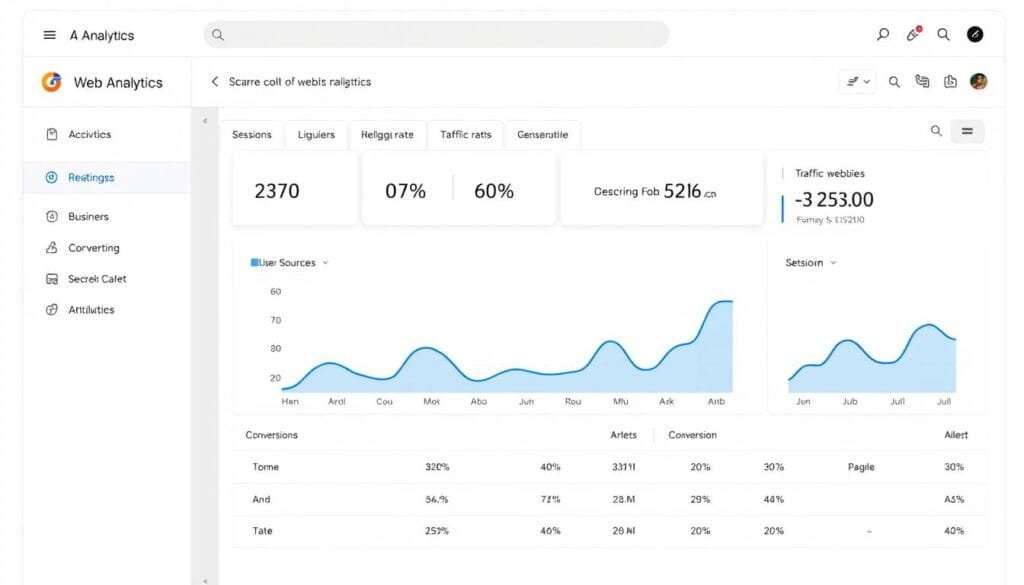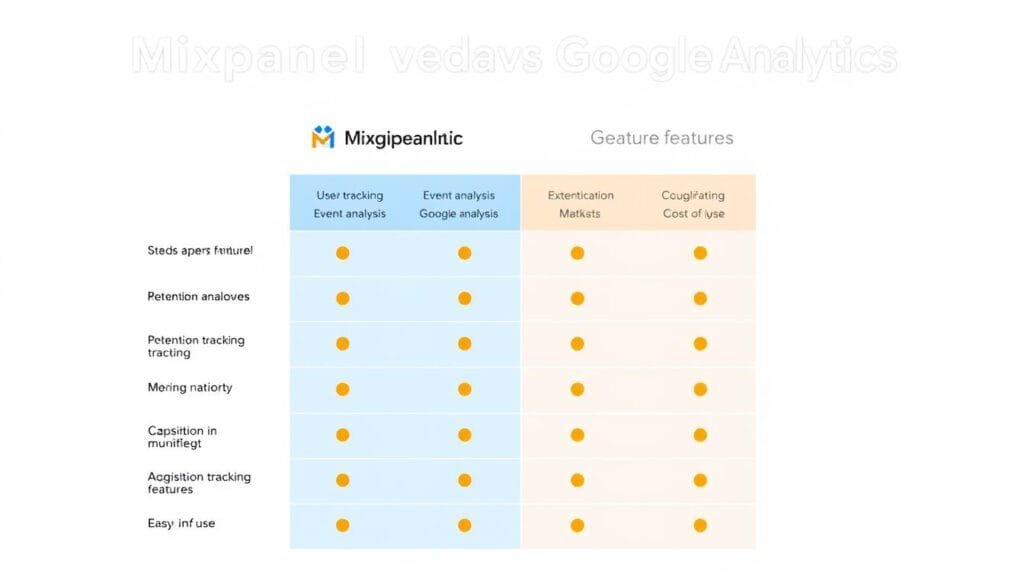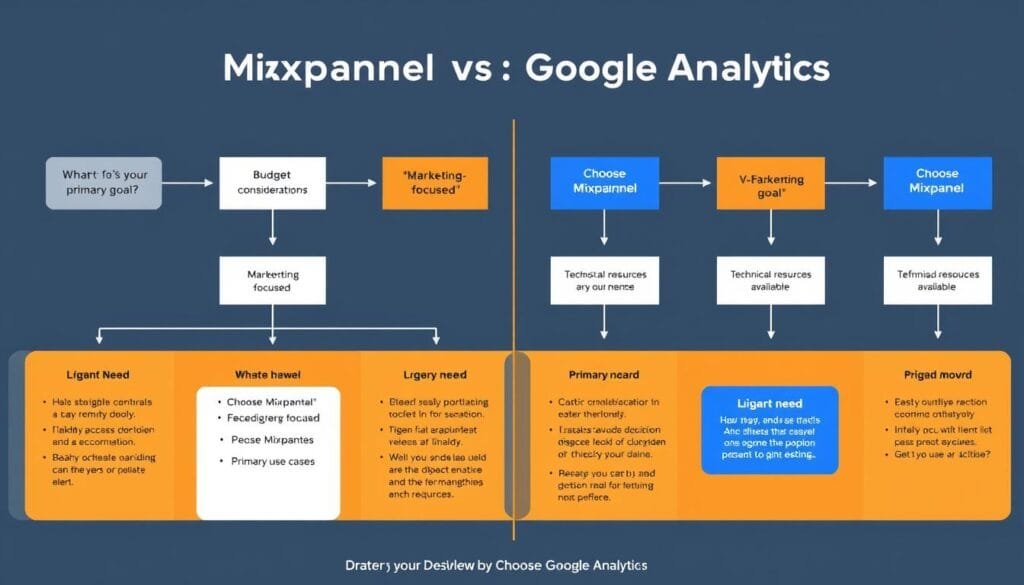This comprehensive comparison will help you navigate the strengths, limitations, and ideal use cases for both Mixpanel and Google Analytics in 2025, providing you with actionable insights to make the right choice for your organization.
Overview: Understanding Mixpanel and Google Analytics
Mixpanel and Google Analytics: Key differences at a glance
Before diving into the specifics, let’s establish a clear understanding of what each platform offers and their core purposes.
What is Mixpanel?
Mixpanel is a product analytics platform designed to help businesses understand how users interact with their digital products. It focuses on tracking user behavior within websites, mobile apps, and SaaS products, providing detailed insights into user journeys, feature adoption, and retention. Mixpanel’s event-based tracking model allows companies to analyze specific user actions rather than just page views.
What is Google Analytics?
Google Analytics, now primarily referring to GA4 (Google Analytics 4), is a web analytics service that tracks and reports website traffic and user engagement. It offers comprehensive acquisition data, showing how users find your site, along with behavior and conversion metrics. GA4 has evolved from its session-based predecessor to an event-based model that works across websites and apps, with enhanced machine learning capabilities.
Mixpanel Deep Dive: Features and Capabilities in 2025
Mixpanel’s 2025 dashboard with enhanced user behavior tracking capabilities
Key Features (2025 Updates)
- Advanced User Behavior Tracking: Mixpanel excels at tracking specific user interactions within your product, allowing you to understand exactly how users engage with features.
- Enhanced Retention Analysis: The 2025 version offers improved cohort analysis tools that help identify factors affecting user retention and churn.
- AI-Powered Insights: New machine learning algorithms automatically surface patterns and anomalies in user behavior that might otherwise go unnoticed.
- Custom Event Tracking: Define and track unlimited custom events without requiring extensive coding knowledge.
- Funnel Analysis: Visualize and optimize conversion paths with detailed funnel reports that identify drop-off points.
- Group Analytics: Analyze how organizations (not just individuals) use your product, essential for B2B SaaS companies.
Strengths of Mixpanel
Pros
- Superior product analytics with granular user behavior insights
- Excellent for tracking feature adoption and product engagement
- Powerful segmentation capabilities for targeted analysis
- Retroactive analysis allows you to analyze historical data in new ways
- Strong retention and cohort analysis tools
- User-friendly interface with intuitive report building
Cons
- Higher cost compared to Google Analytics’ free tier
- Requires more setup and configuration than GA4
- Less comprehensive for acquisition tracking
- Limited SEO and marketing campaign analysis
- Steeper learning curve for non-technical users
- Can become expensive at scale with high event volumes
Google Analytics Deep Dive: Features and Capabilities in 2025

Google Analytics 4 dashboard with enhanced acquisition and journey tracking in 2025
Key Features (2025 Updates)
- Enhanced Predictive Analytics: GA4’s machine learning capabilities now offer more accurate predictions about user behavior and conversion likelihood.
- Privacy-Centric Measurement: Evolved to function effectively in a cookieless world with improved modeling for data gaps.
- Cross-Platform Tracking: Seamlessly track user journeys across websites and mobile apps with unified reporting.
- Expanded BigQuery Integration: More accessible and comprehensive data export options for advanced analysis.
- Automated Insights: AI-driven anomaly detection and opportunity identification with actionable recommendations.
- Enhanced E-commerce Tracking: More detailed shopping behavior analysis with improved attribution models.
Strengths of Google Analytics
Pros
- Comprehensive free tier suitable for most businesses
- Excellent acquisition tracking and traffic source analysis
- Seamless integration with Google’s ecosystem (Ads, Search Console)
- Strong marketing campaign performance measurement
- Built-in machine learning capabilities
- Easier initial setup with automatic event tracking
Cons
- Less granular product analytics compared to Mixpanel
- More complex user interface with steeper learning curve
- Limited retroactive analysis capabilities
- Less detailed user-level behavior tracking
- Data sampling can affect accuracy for high-traffic sites
- More marketing-focused than product-focused
Head-to-Head Comparison: Mixpanel vs Google Analytics in 2025

Feature comparison between Mixpanel and Google Analytics across key categories
Pricing Models
| Feature | Mixpanel | Google Analytics |
| Free Tier | Up to 100K monthly tracked users with core features | Unlimited users with standard features |
| Entry-Level Paid Plan | Growth: $25/month for up to 1M events | N/A (Free tier is comprehensive) |
| Mid-Tier Plan | Enterprise: Custom pricing based on events | GA360: Starting at $50,000/year |
| Pricing Model | Based on monthly tracked users and events | Free tier with premium enterprise option |
| Data Retention | Unlimited in paid plans | 14 months (extendable in GA360) |
Ease of Use
When it comes to ease of use, both platforms have evolved significantly by 2025, but they still maintain distinct approaches:
Mixpanel
Mixpanel offers an intuitive interface focused on product analytics. The platform excels at making complex user behavior analysis accessible through visual report builders and drag-and-drop functionality. However, initial setup requires more thoughtful planning around event tracking strategy and implementation.
Google Analytics
Google Analytics provides a more comprehensive but potentially overwhelming interface. While GA4 has improved its user experience since its initial release, it still presents a steeper learning curve for beginners. The advantage is its enhanced automatic event tracking, which requires less initial configuration.
Customization
Both platforms offer extensive customization options, but with different approaches:
Mixpanel
Mixpanel provides flexible custom event definitions and properties, allowing for highly specific tracking of user interactions. Its strength lies in the ability to create custom formulas, cohorts, and funnels without requiring technical expertise. The 2025 version offers enhanced no-code customization options.
Google Analytics
GA4 offers powerful customization through custom dimensions, metrics, and events. The platform’s integration with Google Tag Manager provides extensive flexibility for advanced users. However, complex customizations often require more technical knowledge compared to Mixpanel.
Data Privacy Compliance
By 2025, data privacy regulations have become even more stringent globally, making compliance a critical consideration:
Mixpanel
Mixpanel offers robust data governance features including data residency options, consent management, and anonymization tools. The platform provides clear controls for managing personal data in compliance with GDPR, CCPA, and newer privacy regulations implemented since 2023.
Google Analytics
Google has significantly enhanced GA4’s privacy capabilities to address global regulations. The platform now offers more granular consent controls, data deletion capabilities, and reduced reliance on cookies. However, some organizations in highly regulated industries may still face challenges with Google’s data processing practices.
Scalability
As businesses grow, their analytics needs evolve, making scalability an important consideration:
Mixpanel
Mixpanel scales well for product-focused companies with growing user bases, though costs increase with event volume. The platform handles complex product analytics needs effectively but may become expensive for very high-volume applications.
Google Analytics
Google Analytics offers excellent scalability through its free tier, which handles significant traffic volumes. For enterprise needs, GA360 provides enhanced processing power and higher limits. The platform’s integration with BigQuery enables virtually unlimited data analysis capabilities.
Use Cases: When to Choose Each Platform
When to Choose Mixpanel
Mixpanel excels at tracking product usage and feature adoption for SaaS applications
- SaaS Companies: If you’re running a software-as-a-service business where understanding product usage and feature adoption is critical, Mixpanel provides the detailed insights you need to optimize your product.
- Mobile App Developers: For teams focused on mobile app engagement and retention, Mixpanel’s user-centric tracking provides valuable insights into how users navigate and interact with your app.
- Product-Led Growth Companies: Organizations that rely on product experience to drive growth will benefit from Mixpanel’s detailed user journey and behavior analysis.
- Subscription-Based Businesses: Companies with subscription models can leverage Mixpanel’s retention analysis to reduce churn and increase lifetime value.
- Teams with Dedicated Analysts: If you have data analysts who can maximize the platform’s capabilities, Mixpanel’s depth of analysis provides significant value.
When to Choose Google Analytics
Google Analytics is ideal for content websites and marketing campaign tracking
- Content Websites: For blogs, news sites, and content-focused platforms, GA4’s comprehensive acquisition tracking provides valuable insights into traffic sources and content performance.
- E-commerce Businesses: Online retailers benefit from GA4’s enhanced e-commerce tracking, marketing attribution, and integration with Google’s advertising platforms.
- Small to Medium Businesses: Organizations with limited analytics budgets can leverage GA4’s robust free tier to gain valuable insights without significant investment.
- Marketing-Focused Teams: If your primary focus is on marketing performance, campaign tracking, and acquisition metrics, GA4 provides comprehensive tools.
- Multi-Platform Businesses: Companies with both web and app presence can use GA4’s cross-platform tracking to understand the complete customer journey.
Analytics Trends in 2025: What’s Shaping the Industry
AI-Driven Analytics
By 2025, artificial intelligence has transformed how businesses interact with analytics platforms. Both Mixpanel and Google Analytics have integrated advanced AI capabilities, though with different approaches. GA4 leverages Google’s machine learning expertise to provide predictive insights and automated anomaly detection across marketing and acquisition data. Mixpanel focuses its AI capabilities on product experience optimization, automatically identifying patterns in user behavior that impact retention and engagement.
Privacy Regulations and Cookieless Tracking
The analytics landscape in 2025 continues to adapt to stricter privacy regulations and the deprecation of third-party cookies. Both platforms have developed alternative tracking methodologies, with GA4 implementing enhanced modeling techniques to fill data gaps and Mixpanel focusing on first-party data collection with robust consent management. Organizations must consider these approaches when evaluating which platform better aligns with their privacy requirements and data collection strategies.
Cross-Platform Tracking Evolution

Decision flowchart: Choosing between Mixpanel and Google Analytics based on your business needs
The ability to track users across multiple platforms and devices has become increasingly important. GA4 has strengthened its cross-platform capabilities, providing a more unified view of the customer journey across web and mobile. Mixpanel has enhanced its identity resolution features to maintain consistent user profiles across touchpoints. For businesses with complex multi-platform experiences, evaluating each tool’s approach to cross-platform tracking is essential.
Conclusion: Making Your Decision
Choosing between Mixpanel and Google Analytics in 2025 ultimately depends on your organization’s specific needs, goals, and resources. Both platforms have evolved significantly, offering powerful capabilities for understanding user behavior and driving business growth.
Choose Mixpanel if:
- Your primary focus is product analytics and understanding user behavior within your application
- You need detailed insights into feature adoption, user journeys, and retention
- You have the budget for a specialized analytics tool and the resources to implement it effectively
- Your business model relies heavily on user engagement and product-led growth
Choose Google Analytics if:
- Your primary focus is marketing performance, acquisition tracking, and website traffic analysis
- You need a cost-effective solution with a comprehensive free tier
- You rely heavily on Google’s ecosystem for advertising and marketing
- You need a more general-purpose analytics platform that covers a wide range of use cases
Many organizations find value in implementing both platforms, using Google Analytics for acquisition and marketing insights while leveraging Mixpanel for deeper product analytics. This complementary approach provides a comprehensive view of the entire customer journey from initial awareness through long-term engagement.
As analytics technology continues to evolve, staying informed about new features and capabilities will help you maximize the value of whichever platform you choose. The most important factor is selecting the tool that best aligns with your specific business objectives and provides the insights you need to drive growth and success.
Share Your Experience
Which analytics platform do you prefer for your business needs? Have you found success with one platform over the other? Share your experiences in the comments below or on social media to help others in their decision-making process.
Also read: A/B Testing Made Easy with Optimizely: Full Review & Use Cases











